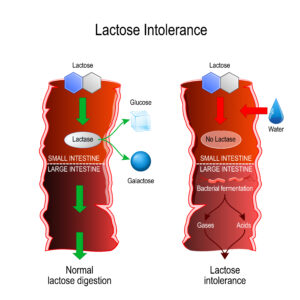Lactose intolerance is a digestive problem where the body can’t break down lactose; a sugar made up of galactose and glucose. People with lactose intolerance can’t eat foods like dairy containing lactose.
Some signs of lactose intolerance are bloating, diarrhea, stomach pains, vomiting, and stomach cramps. Usually, the symptoms start to show up immediately after eating dairy foods, but the timing and severity of symptoms can vary from person to person.
Because the symptoms of lactose intolerance are similar to those of irritable bowel syndrome and other conditions, it is essential to.
What makes people unable to digest lactose?
 The enzyme lactase breaks down lactose into its parts: galactose and glucose. This process makes it easier for the blood to take in the sugars.
The enzyme lactase breaks down lactose into its parts: galactose and glucose. This process makes it easier for the blood to take in the sugars.
People with lactose intolerance don’t make enough lactase, so lactose stays undigested in the digestive system. When bacteria in the gut ferment lactose that hasn’t been digested, they make different gases. These gases cause the symptoms described above.
Most of the time, lactose intolerance is passed down through families. Such situations don’t change throughout a person’s life. I’ve seen cases of lactose intolerance that may only last a short time, usually after an infection.
How do you treat lactose intolerance?
You can’t fix lactose intolerance with any treatment. Limiting foods with lactose help control the symptoms. Many lactose-free products are on the market, like lactose-free milk, yogurts, and potato milk.
Lactose-intolerant people don’t eat dairy products, so it’s a good idea to take calcium and vitamin D supplements to ensure their bodies get the proper amounts of these essential nutrients. Many of these alternatives to cow’s milk are also made with extra calcium and vitamin D.
Lactase Enzymes for lactose intolerance
Doctors may sometimes advise exogenous oral lactase enzymes for lactose intolerance. Lactase enzymes are made from fungi or yeasts and come in the form of gels, liquids, capsules, or tablets.
Lactase enzyme is usually taken in a dose of 6,000 to 9,000 international units (IU) right before a meal with dairy. It is always best to start with a small amount and slowly increase it.
Lactase enzyme supplements and their safety
Lactase enzyme supplements are safe and don’t seem to cause any problems. But people with diabetes and other health problems should be careful. Since lactase is broken down into simple sugars, it is crucial for people with diabetes to check their blood sugar levels after taking lactase to make sure they are not absorbing too much of the sugars.
Lactase enzymes can also cause allergic reactions like anaphylaxis in some people. If you don’t treat anaphylaxis, it can lead to severe problems like shock, coma, and in the worst cases, death.
Because we don’t know enough about their safety, lactase supplements are not recommended for pregnant or breastfeeding women.
How well do lactase enzymes work?
Even though lactase supplements have many benefits, little is known about how well they work.
The lactose breath test is a way to determine if someone can’t handle lactose. A randomized trial published in 2010 in the European Review for Medical and Pharmacological Sciences found that lactase supplements significantly improve lactose breath test results and gastrointestinal symptoms in lactose-intolerant patients. The 60 participants in the study showed that taking a lactase supplement 15 minutes before eating normalizes lactose metabolism to levels similar to those provided by the probiotic Lactobacillus reuteri. The study also found that lactase supplements eased the symptoms of lactose intolerance, like gas.
In contrast, a study from 2014 published in the journal BioMed Research International said that lactase supplements had mixed results. The lactase breath test showed that only 21.88% of the 96 people who took a lactose supplement were back to normal, while 17.71% had no response.
The different results suggest that not being able to metabolize lactose may be caused by more than just a lack of lactase enzymes and that more research is needed to determine what those factors are.

